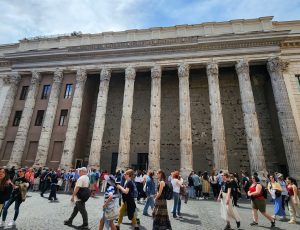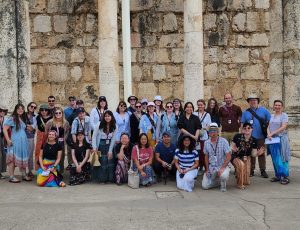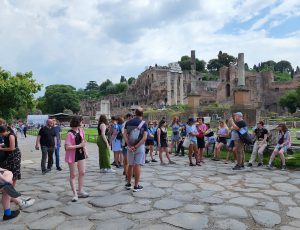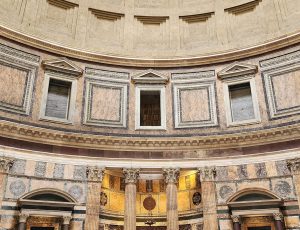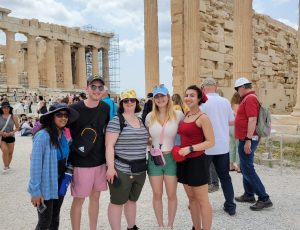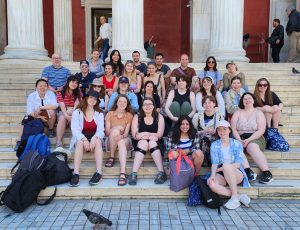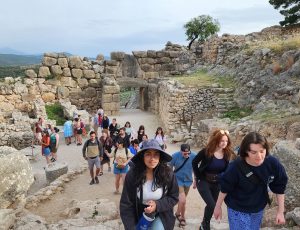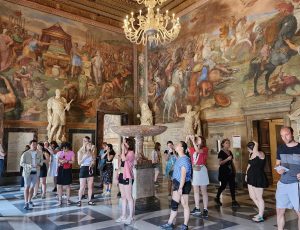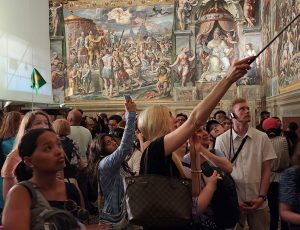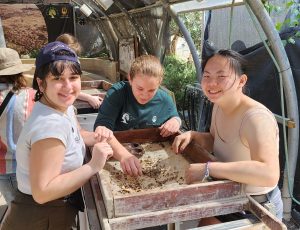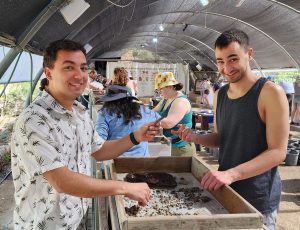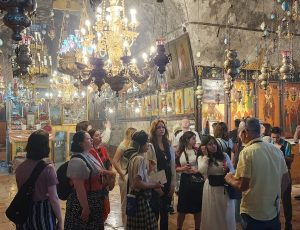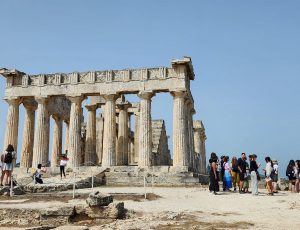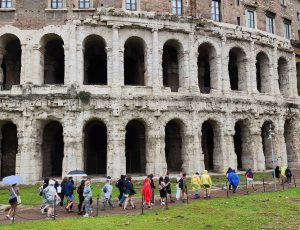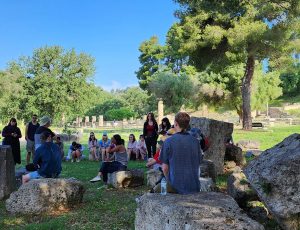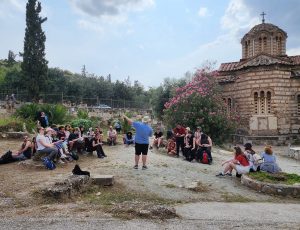- Greetings from the Director, Shane Hawkins
- Wake-up Call of the Millennium by Professor Farhang Rajaee
- Alumni News
- College News
- June 2023 BHUM and BJHUM Graduates
Greetings from the Director, Shane Hawkins
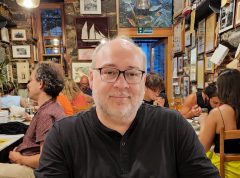
Greetings to all on the occasion of our second BHum newsletter! Although I had hoped to get this edition out earlier, it has been a wonderfully active spring and summer in the College. So, while the newsletter is delayed, it is only for the happiest of reasons.
For me, May was the culmination of a great deal of planning, as Professor Dolansky and I accompanied thirty students on a three-week course abroad, our new HUMS 3800: Humanities in Context.
It was a relentless trip that took us first to Israel, with stops in Tel Aviv, Jaffa, Caesarea, Megiddo, Beit Alpha, Tel Hatzon, Capernaum, Galilee, Bei She’an, the Jordan River, Masada, the Dead Sea, Qumran, and Jerusalem. Then we were off to Athens and a tour of the Peloponnesus, including the island of Aegina, Cape Sounion, Corinth, Nafplio, Epidaurus, Mycenae, Olympia, and Delphi. Finally we spent our last week in eternal Rome, with a day trip to Pompeii and Naples.
We travelled by plane, bus, tram, train, boat and ferry, but mostly we walked and walked and walked, sometimes in the rain, until our feet hurt, to absorb as much as we possibly could. It was exhilarating and exhausting. And for many of our students it was also a life-changing opportunity to experience in a vivid first-hand encounter the art, architecture, archaeology, and cultures that they study in the classroom: temples and ruins, Rembrandts and Raphaels, Palace and Palazzo and Parthenon and Pantheon. And of course, there was a lot of hummus, souvlaki, and never, ever, enough gelato. I will never tire of watching the reaction of a student who comes face-to face for the first time with a statue, painting, or artifact that is familiar to them from a textbook. I could only laugh when at one point we entered a corridor flush with ancient statuary and a dumbfounded student quietly stammered, ‘Are these … real?’
The theme of the course was ‘Monument and Memory’, with an emphasis on the connections between monumentality and nationality. Student projects for the course were wide-ranging and included topics such as monuments and national identity, ritual bathing, Egypt and othering, approaches to conservation, and dedications and grave gifts.
I would like to sincerely thank former ambassador Robert W. Peck and his spouse Maria Pantazi Peck, along with the Canadian Institute for Mediterranean Studies, whose generosity made possible two merit-based awards for outstanding student projects. The first place recipient is Declan O’Meara, for her project on Mediterranean Foodways. The second place recipient is Bianca Mckeown, for Theatre and Catharsis as a Tool for Healing. Congratulations to both!
Our thanks to all of you who contributed to the fundraising efforts for the trip through Carleton’s Futurefunder.
At the beginning of March the College hosted the Rose Maguire Lecture in the Humanities. Professor Irene (Irena) R. Makaryk, Distinguished University Professor from the Department of English, University of Ottawa, spoke on the theme ‘Wild and Whirling’: Shakespeare, War, and Cabaret. In her lecture she explored how theatre can effectively encompass the complexity of war, its irrationality, barbarism, as well as its moments of great humanity. Using Shakespeare cabaret in Ukraine as a case study, she followed the genre’s origins through Les Kurbas’s radical Macbeth (1924), the Dakh Daughters (2014), to the recent Bunker Cabaret (2023).
Later that month our students hosted this year’s Humanities Colloquium. The event was well attended and there were eight excellent student presentations on a great variety of topics: Dostoevsky, Bakhtin, Hegel, Sartre, the Bhagavad Gita, Thoreau, Montesquieu, Augustine, Chaucer, and Eugenics! Emily Dimou won first prize for her paper, ‘Here bygynneth game: a critique of courtly love in Chaucer’s Troilus and Criseyde’; second place went to Alex Dolansky, ‘A Perfect Society? Eugenics and Socialism in Early 20th Century Canada’; third place was awarded to Grace Learn, ‘The Problem of Recognition and the Gaze of the Other in a Sartrean Reading of Notes from Underground by Fyodor Dostoevsky’.
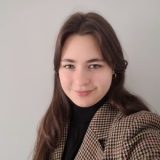
Marina Nekrasova
Finally and on an unrelated note, I would like to congratulate three of our outstanding students.
Congratulations to Marina Nekrasova, a third-year BHum and Philosophy student who was named this year’s Provost Scholar and was also award the the Peter J. Ricketts Outstanding Provost Scholar Award.

Sadie Badour
Congratulations also to FASS fourth-year undergraduate students Sadie Badour (History and Humanities) who was invited to publish an article reflecting on her recent practicum experiences at Ingenium.
 Thora Asudeh has been awarded the 2023 Maurice Price Foundation Summer Research Internship. She will be conducting archival work on the Åland Islands, an autonomous region of Finland, on 16th century reformation movements.
Thora Asudeh has been awarded the 2023 Maurice Price Foundation Summer Research Internship. She will be conducting archival work on the Åland Islands, an autonomous region of Finland, on 16th century reformation movements.
In the rest of this newsletter you will find an important and thoughtful message from the former College Director, Farhang Rajaee. There is also a short report of the activities of the Enlightenment Reading Group this year, and our congratulations to the graduating class of 2023.
We hope this is a way to keep you informed about the College and for you to stay in touch with us.
Shane Hawkins
Director of the College
Wake-up Call of the Millennium by Professor Farhang Rajaee
 What do I want to convey to my academic family, the college of Humanities- colleagues and student body whether now or alumni- in this “hard and in some ways dark times?” This question led to lengthy conversation between me and myself- “the two in one.” In the end, I thought I would share with you what I think about the main agent responsible for the hard and dark times. For me, this agent is the virus of this rare pandemic that has disrupted every aspect of humanity’s life since “WHO China Office” reported on December 2019 of an unknown virus outbreak in Wuhan City. I contend that the Covid pandemic was the most significant event in our time while at the same time bringing with it a giant wake-up call for the new millennium.
What do I want to convey to my academic family, the college of Humanities- colleagues and student body whether now or alumni- in this “hard and in some ways dark times?” This question led to lengthy conversation between me and myself- “the two in one.” In the end, I thought I would share with you what I think about the main agent responsible for the hard and dark times. For me, this agent is the virus of this rare pandemic that has disrupted every aspect of humanity’s life since “WHO China Office” reported on December 2019 of an unknown virus outbreak in Wuhan City. I contend that the Covid pandemic was the most significant event in our time while at the same time bringing with it a giant wake-up call for the new millennium.
I am not a historian to offer a contextual evaluation of this major event, nor am I a scientist to offer a general evaluation of its meaning for our health and medical sciences. As somebody who has been thinking, teaching, and researching on the human condition and the political for the past few decades, I would like to offer my take on what Covid-19 taught me about the human condition, and more specifically how that lesson relates to academic life and the place of university in human civilization. In this venture, I will be in conversation with the unique and possibly greatest mind in social sciences in the past century, Hannah Arendt (1906- 1976, Jewish-German American theorist).
Here is the question in the back of my mind: How has Covid-19 given us a warning about the place and significance of university and academic experience for human civilization? Arendt begins her classic The Human Condition (1958) with the news of the orbiting of the earth by “an earth-born object made by man” (p. 1) on 4 October 1957. Many interpretations have been offered for the symbolic meaning of that event, but for Arendt it offered a new Archimedean point from which we could look at ourselves. One of the conclusions she drew from this new perspective was that “the earth is the very quintessence of the human condition … providing human beings with a habitat in which they can move and breathe without effort and without artifice” (p. 2). The other conclusion for her was that the earth not only makes our existence possible, but more so it facilitates the life of plurality in which we can develop and flourish our own individuality and uniqueness, by serving as a stage for human presence that we call “the public sphere.” A place in which we can come together through “dialogue” (i.e., through speech and reason- “logos”); first between me and myself, “the soundless dialogue (eme emauto)” (p. 291), second between me and the “other’ and third with the world. Covid-19 demonstrated how these two great features of the earth as part of our human condition are precarious, could be threatened, and even destroyed. In that sense, Covid should be seen as a giant wakeup call. The areas that made this wakeup call more concrete for me are the university and academic experience. Similar to the first satellite, university also is an “an earth-born object made by man,” established for each human being to experience a life of mind and soul, so that when the new generation inherits the world from the previous one as full-fledge citizen, its members would be great actors in the unfolding drama of human civilization.
Universities offer a great stage, a theater, an arena, and an open field for the battle of ideas which makes possible the expansion of horizons and enhancement of human flourishing. A statesman, a renaissance man, and the third president of the United States, Thomas Jefferson (1743- 1826), is credited for establishing the University of Virginia. Apparently, the intellectual base of the University was and in fact every modern university should be the following statement Jefferson wrote to someone in 1820: “This institution will be based on the illimitable freedom of the human mind. For here we are not afraid to follow truth wherever it may lead, nor to tolerate any error so long as reason is left free to combat it.” That is why the sacrament there and in theory in all universities is “academic freedom” and encouragement of the battles of ideas. At the same time, we know that the battle of ideas is not just communicating by words alone because actual research and available data suggests that between 70 to 90 percent of actual communication is nonverbal. The physical space where people come together, make their presence known to each other, is much more important.
University as a place of gathering is a republic of equal or perceived equal citizens, whose distinction is self-earned recognition, that is why “politics of recognition” lies at the heart of its functioning. The modus operandi of its citizens coming and acting together is openness, fairness, and transparency with a good degree of equality or at least equality of opportunity for participation. Universities, whether now or in their earlier reincarnations as in Mesopotamian libraries, the Academy of Plato or the Lyceum of Aristotle in Ancient Greece, The Academy of Gondishapur of Ancient Persia, “the House of Wisdom” of Muslim civilization- the precursor of modern universities- displayed the same rules of the game, when those civilizations were alive and universities functioning.
Fast forward, during the pandemic the two features of our earthly human condition were compromised. We could no longer “move and breathe without effort and without artifice,” and worse we were not even allowed to move. And obviously the possibility of coming together and plurality stopped altogether as a consequence. Despite this, most of us participated to the best of our abilities to salvage them as much as possible. Thanks to the machinery and mechanisms or software programs produced by the double revolutions of “technology and communication” in the last quarter of the past century; we got together and tried to communicate through “distance learning.” For example, “Zoom” became a household name and supposedly a saving grace for the lack of being together. But was it really a saving grace? Speaking from personal experience, I cannot even reluctantly answer in the positive. It was neither “grace” nor a “savior; almost daily, I felt triple Ds- “Deep, Destructive, and Depressing” isolation and loneliness. In her classic work, The Origin of Totalitarianism (1951), Arendt demonstrates how totalitarian mindset and totalitarian regimes cannot dominate anyone totally, but they can create a condition of distrust and precariousness so that “losing it,” as common wisdom tells us, becomes the rule, thus incapacitating almost everyone. The pandemic was totalitarian. As she puts it: “What makes loneliness so unbearable is the loss of one’s own self which can be realized in solitude but confirmed in its identity only by trusting and trustworthy company of my equals. … Self and world, capacity for thought and experience are lost at the same time” (p. 477).
Universities more than any man-made institutions, and here in particular place like the College of the Humanities, are committed to create “space, theater, and arena” for the possibility of paradoxical situation of “individual /plural” and in Arendt’s notions “solitude/ company” for humanity to experience solitude where, in Arendt’s words, “I am by myself, together with myself, and therefore two-in one.” Just as an example, think about the individual desks in the library when one ventures on solitude while being encircled by the great minds of various sort in form of other students and books in the shelfs. When I was thinking to write this heartfelt piece, I visited the library in the university and I even practiced a little solitude there and was grateful to be “by myself,” while there with literally close to fifty people around me in the floor, even if I say nothing of the great many minds around and accessible to me in the shelves.
This year when we are gradually moving to “normalcy,” I felt the three Es- empowered, energized, exhilarated- thus grateful that we seem to be getting our “very quintessence of the human condition” back. This is the wake-up call and I hope a warning for our responsibility not to forget that we and we alone are the sustainers of our human condition, whether our own wellbeing, the well-being of our valuable institutions, and the sustainer of our beautiful and kind “mother earth.” By “we alone” not only I mean every member of humanity but also particularly those who value thinking and the thinkers of the past and who teach the humanities in a technologically focused world that often neglects and forgets the centrality of what we do to the very nature and well-being of the human condition. These segments of the human population are the officers of that humanity and of course keepers and the teachers of it. It may appear strange to end my meditation by thanking “Covid Virus” for this important wakeup call. But a great warning is always a blessing regardless of the source!!!!
Alumni News
Are you an alum with some professional or personal news you’d like to share? Keep us updated!
Do you know any prospective students who would be interested in the BHum or would you be interested in helping the College with recruiting events? You can find information here.
College News
The Enlightenment Study Group by Teaghan Haysom and Thora Asudeh, 4th Year HUMS.
Throughout March, Professors Geoffrey Kellow and Marc Hanvelt hosted a reading group for 12 students that centred on Dennis C. Rasmussen’s The Infidel and the Professor: David Hume, Adam Smith, and the Friendship that Shaped Modern Thought. Teaghan and Thora attended the group as two third-year students in the Humanities.
The reading group consisted of students from the College of the Humanities and undergraduates and MA students from the Department of Political Science. Participants attended discussion sessions to talk about the book and converse with other students. This culminated in a discussion with the author Dennis Rasmussen, a professor of Political Science, at Syracuse University. At that session students discussed their favourite aspects of the book, asked questions, and gained insight into Rasmussen’s writing process. After a public lecture by Professor Rasmussen in the Humanities lecture hall, the conversation continued into the evening at a dinner for all at Von’s Bistro. To top it all off, students received a free copy of the book and a $100 Amazon gift card.
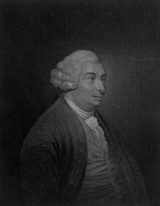
As third-year Humanities students, we were recently exposed to the work of Hume and Smith in our HUMS3000 lectures where we read part of The Wealth of Nations and a few of Hume’s essays on luxury and arts. Drawing on the academic expertise of Professor Kellow and Professor Hanvelt, students were able to explore fundamental questions about Hume and Smith.
Reading and discussing Rasmussen’s book was a delight, as we were able to draw on lecture material and our experience with some of Hume and Smith’s primary texts to better understand the Infidel and the Professor. The book was refreshing, easy to understand, and academically engaging, as it explored the connections between Hume and Smith through their letters and account of their friendship.

In both his book and lecture, Rasmussen focussed on the way Hume and Smith influenced each other when it came to discussions on religion and how Rasmussen used their friendship to posit that Smith was more skeptical towards religion than is commonly held to be true. This aspect of the book created interesting conversations on Smith and Hume’s understanding of tolerance, the public sphere, and their literary output. In the Humanities we study primary sources, however, this book analyzed the primary sources for us, and instead offered commentary and analysis on the lengthy friendship between these two important figures of the Scottish Enlightenment. This was a new and welcomed challenge.
Having the chance to discuss the book, both in the discussion room and over French onion soup and wine, enriched our understanding of the topics and offered a less stressful environment to talk about our academic interests. Kellow, Hanvelt, and our peers facilitated an insightful and thorough discussion.
A special thank you to the Institute for Liberal Studies for funding this exciting opportunity, and a sincere thank you to Professors Kellow and Hanvelt for organizing the program and offering his time for the enjoyment and betterment of students.
June 2023 BHUM and BJHUM Graduates
Congratulations to all of our 2023 graduating students!
We are so proud of what you have accomplished during these last few challenging years and we are excited for you as you embark on the next phase of your life. We wish you all the best in these new adventures and encourage you to stay in touch. As a Humanities and Carleton alumni, your experiences and mentorship are invaluable for the students who follow in your footsteps.
Learn More About Some of Our B.Hum Graduates!

